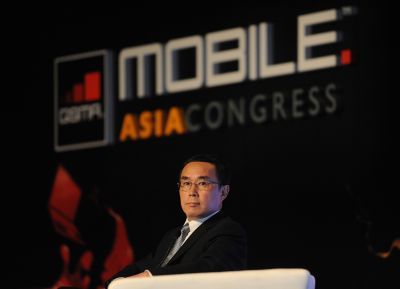Telecom giants converge at Asia's top mobile show

Leaders of Asia Pacific telecom giants meet in Hong Kong Wednesday for the industry's top trade show in the region as they vie to dominate the world's fastest-growing and most diverse mobile market.
Mobile operators, handset makers, software companies and media groups will put their latest innovations on display at Mobile Asia Congress, the Asian segment of the world's premier telecom event held in Barcelona every year.
The number of mobile connections in the Asia Pacific is expected to cross the two billion mark this year, more than triple the 2003 figure, according to statistics released by organiser GSMA, a trade association for the global mobile industry.
By 2013, GSMA estimates that the number of mobile connections in the region will exceed three billion and account for half of the world's connections.
"The figures say how important Asia is as a region. If you couple that with the nearly two billion people in Asia who don't have a mobile connection, it just really creates such a growth opportunity for the industry," Michael O'Hara, GSMA's chief marketing officer, said in an interview with AFP.
The opportunities also came from the vast diversity in mobile usage and the macro-economic variations among the 47 countries in the region, O'Hara said.
In places like Singapore, Hong Kong, New Zealand, Australia and Taiwan, many people use multiple SIM cards and are constantly looking for top-end designer mobile products.
But GSMA statistics show that only 46 percent of people in China and 30 percent of the population in India have access to mobile technology. This gives rise to an enormous potential market for low-cost mobiles for the under-privileged in the remote rural areas of the two countries.
Bertram Lai, a Hong Kong-based analyst with CIMB GK Securities, said the growth in China's mobile industry would come from the rural areas, which only have a 22 percent penetration rate at present.
"The growth is supported by the government's policy to increase rural income and consumption," Lai told AFP.
Unlike previous years, GSMA said it has enlisted only the cream of the industry crop for this year's Mobile Asia Congress. It expects to have just over 1,000 attendees this time, compared to 6,200 at last year's event in Macau.
The organiser has invited only 26 CEOs - compared to last year's 300 - including China Mobile's Wang Jianzhou, China Unicom's Chang Xiaobing, Bharti Airtel's Manoj Kohli, and Alcatel-Lucent's Sean Dolan.
"We want to make it a smaller, more focused event, to bring the key leaders in the industry to talk about GSMA's initiatives for next year," O'Hara said.
Among the issues topping their agenda is a call on governments to remove telecom-specific taxes. A GSMA report showed that countries such as Indonesia, India, Bangladesh and Sri Lanka have imposed a 10-33 percent duty on imported handsets.
"A main driver for reform is that growth in tele-density will now come from growth in rural areas, where the cost of providing services is higher and the per capita income is significantly lower," the report said.
"Encouraging adoption of mobile services will only be possible through lowering prices and breaking down entry barriers for end-customers."
The association also called on Asian policymakers to have transparent and predictable regulatory regimes in order to attract long-term investment in the mobile sector.
Join our commenting forum
Join thought-provoking conversations, follow other Independent readers and see their replies
Comments
Bookmark popover
Removed from bookmarks